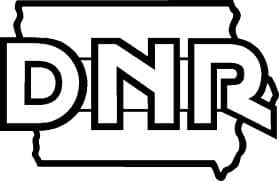Iowa’s Black Hawk Lake Fish Renovation to Take Place Thursday
Iowa Department of Natural Resources 11.06.12

Black Hawk Lake is on the cusp of the largest Iowa lake renovation in more than a quarter century. The 922-acre natural lake, suffering from poor water quality, a large carp population and a cyclical fishery in decline, will have its fish population eliminated on Nov. 8.
The drought of 2012 reduced the lake volume by nearly 45 percent and made the renovation possible. Ben Wallace, fisheries biologist for the Iowa Department of Natural Resources, at Lake View, is heading up the renovation project.
Wallace is coordinating fisheries crews from across the state that will be crisscrossing the lake on preplanned routs applying the fish toxicant, rotenone, to eliminate all fish remaining in Black Hawk Lake.
Rotenone only affects organisms with gills because the chemical is readily taken up through the gills and interrupts oxygen transport. Birds, mammals and other organisms will remain unharmed.
Black Hawk Lake will be fish-free during the winter of 2012-13 as the chemical slowly detoxifies in the cold water. It will be the first winter in more than 30 years that the aeration system will not be running.
Once the carp are gone, Wallace said he expects to see a marked improvement in the water quality and clarity, and aquatic plants returning to the lake. He said the benefits of the lake restoration will be prolonged by work being done in the watershed to reduce sediment and nutrients washing off the land and into the lake.
Landowners in the watershed are participating in the protection of Black Hawk Lake by using conservation practices on their land that reduce runoff and protect water quality. The Black Hawk Lake Protective Association will install a barrier at the lake outlet to prevent carp from re-entering the lake during times of high water, which usually coincides with the time that carp have the strong urge to move upstream to spawn.
“This is not the end of the Black Hawk Lake renovation. There is still a lot of work to do in the watershed and in the lake. We are not stopping. We are just getting started,” he said.
Black Hawk Lake will be restocked in the spring with walleye, bluegill, largemouth bass, channel catfish, black crappie, yellow perch and muskellunge.
“Our hatcheries really came through in a big way because our chemical shipment was delayed long enough to prevent us from stocking fish this fall. They will over winter the fish, allowing us to stock two different year classes in 2013,” Wallace said. “This spring, Black Hawk will essentially be a new lake and when these fish are released, they will grow pretty quickly with some reaching acceptable size in two to four years, depending on the species.”
In an effort to soften the impact of losing a favorite fishing hole, the DNR renovated Black Hawk Pits earlier this year and stocked thousands of adult channel catfish, largemouth bass, walleye and panfish collected from Black Hawk Lake ahead of the renovation.
Black Hawk Pits lies within the lake’s watershed and had carp, buffalo and gizzard shad in its fishery. That rough fish population needed to be eliminated before the lake restoration took place to prevent reintroduction to Black Hawk Lake. Only species that will be re-stocked in Black Hawk Lake were put in Black Hawk Pits because fish could move between the two water bodies during high water events.
Nearby Arrowhead Lake also received adult fish from Black Hawk Lake, but Arrowhead sits outside of the lake watershed and was not renovated prior to the stocking.
A commercial fishing operation removed 130,000 pounds of rough fish prior to the renovation that were sent to various fish markets, including Omaha and New York.
The lake will be closed to boat traffic on Nov. 8 and promiscuous fishing will be closed. Fishery crews will pick up dead fish that surface, as needed, the following week.

